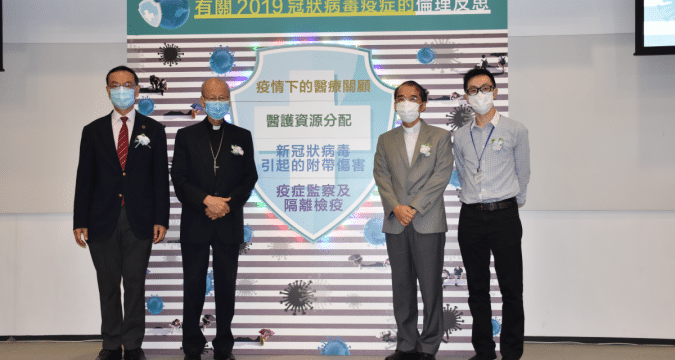
HONG KONG (SE): A two-day seminar on life ethics, organised by the Bioethics Resources Centre of the Holy Spirit Seminary College in cooperation with the Caritas Institute of Higher Education, urged the government as well as different concerned sectors of society to ensure holistic care for people suffering during the Covid-19 coronavirus (SARS-CoV-2) pandemic.
The online seminar was held from September 19 to 20, and over 20 medical practitioners, scholars and priests were invited to speak. They covered four themes: medical care during the Covid-19 coronavirus pandemic; the allocation of medical resources; the trauma caused by the pandemic as well as the cure of the confirmed patients and quarantine measures. Around one hundred people attended online or in person.
The opening ceremony was officiated by John Cardinal Tong Hon, the apostolic administrator of Hong Kong. Present were Father Dominic Lui Chi-man, supervisor of the Bioethics Resources Centre of the Holy Spirit Seminary College; Father Benedict Lam Cho-ming; Doctor Peter Anthony Fok, president of the Guild of St. Luke of St. Cosmas and St. Damian Hong Kong; as well as Kim Mak Kin-wah, principal of Caritas Institute of Higher Education.
Cardinal Tong encouraged consecrated people, volunteers and medical practitioners to be “the protector and the servant of life” in the pandemic. He hoped that the seminar could equip participants to make proper choices based on their consciences. He called on people to build real interpersonal relationships through patience, love and presence. He acknowledged that it would require making use of the Internet to communicate from time to time.
Doctor Gabriel Choi-kin, president of the Hong Kong Medical Association, elaborated on how a patient in the pandemic has various needs besides medical care. For example, he learned of an elderly patient admitted to hospital due to kidney failure. Even though hospital visitation is presently prohibited, some special arrangements were made so that his family could visit him when he was in critical condition. The patient passed away at the end and family members were grateful to the hospital staff.
He also spoke of another patient suffering psychological problems after being laid off by a television company.
Choi explained that it is important to give holistic care to patients, including spiritual care, as many with confirmed infection or suffering from other diseases are under pressure not only due to the lack of medical treatments, but also because of emotional and job problems.
Grace Lui Chung-yan, assistant professor of the Department of Medicine and Therapeutics of the Chinese University of Hong Kong, said the pandemic is a chance to learn and make reflections about people’s values. She believes a question worth pondering would be: will vaccines, if available later, be given to the senior citizens first, considering their higher mortality rate?
She said the crisis has prompted people to make creative changes given the shortage of resources. An example would be the support given by American automobile companies who diverted some of their production lines to produce lifesaving ventilators instead.
In his concluding remarks, Father Lui said it would be important for different sectors to be united to overcome the pandemic. He also expressed the hope that Hong Kong’s parishes would offer consistent support to families affected even after the pandemic has subsided.








